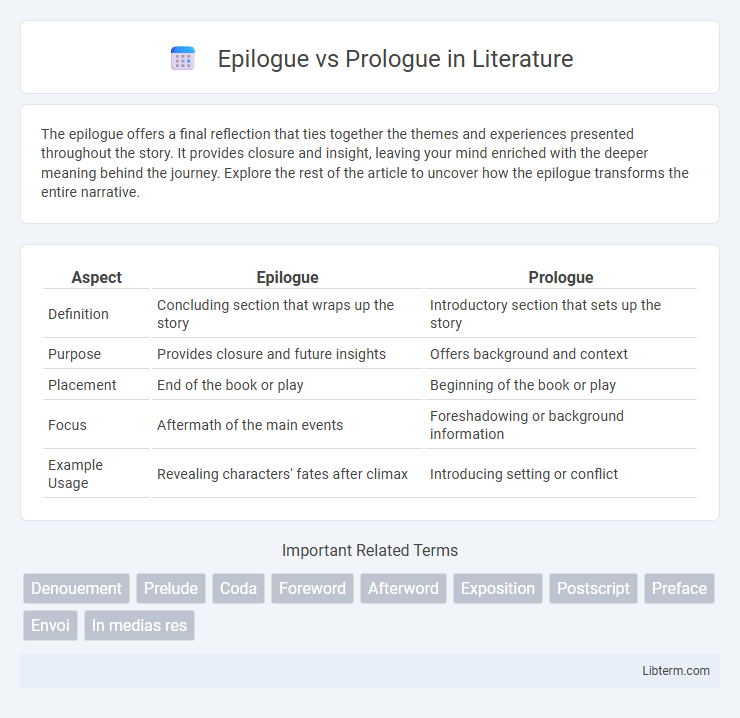The epilogue offers a final reflection that ties together the themes and experiences presented throughout the story. It provides closure and insight, leaving your mind enriched with the deeper meaning behind the journey. Explore the rest of the article to uncover how the epilogue transforms the entire narrative.
Table of Comparison
| Aspect | Epilogue | Prologue |
|---|---|---|
| Definition | Concluding section that wraps up the story | Introductory section that sets up the story |
| Purpose | Provides closure and future insights | Offers background and context |
| Placement | End of the book or play | Beginning of the book or play |
| Focus | Aftermath of the main events | Foreshadowing or background information |
| Example Usage | Revealing characters' fates after climax | Introducing setting or conflict |
Introduction to Epilogue and Prologue
A prologue serves as an introductory section that sets the stage for the main story, providing background information or context that enhances readers' understanding. An epilogue appears at the end of a narrative, offering closure by revealing the fate of characters or continuing the story beyond the main plot. Both elements enrich storytelling by framing the narrative's beginning and conclusion, deepening engagement and comprehension.
Definition of Prologue
A prologue is a preliminary section of a literary work that provides background information, setting the stage for the main narrative. It often introduces key characters, themes, or events that are essential for understanding the story's context. In contrast, an epilogue is a concluding segment that offers closure, detailing the aftermath or future developments following the main plot.
Definition of Epilogue
An epilogue is a concluding section of a literary work that provides closure, often revealing the fate of characters or the aftermath of the story's main events. Unlike a prologue, which introduces background information and sets the scene before the narrative begins, the epilogue appears at the end, enhancing the reader's understanding of the story's full impact. Epilogues are common in novels, plays, and films, serving to tie up loose ends or offer a final reflection.
Purpose of a Prologue
A prologue sets the stage for the story by providing essential background information, context, or events that precede the main narrative, enhancing readers' understanding and engagement. It often introduces key characters, establishes the setting, or reveals significant plot points that influence the unfolding story. Unlike an epilogue, which concludes the narrative, the prologue's purpose is to prepare the audience for what is to come.
Purpose of an Epilogue
An epilogue serves to provide closure by revealing the fates of characters or the consequences of the story's events beyond the main narrative arc. It offers readers insight into the long-term outcomes and can clarify unresolved plot points, enhancing overall understanding. Unlike a prologue, which sets up the story's background or context, an epilogue reflects on the aftermath and final resolution.
Structural Differences: Prologue vs Epilogue
The prologue typically appears at the beginning of a narrative, providing background information or setting the scene before the main story unfolds, while the epilogue is positioned at the end, offering closure or insight into the aftermath. Structurally, a prologue often introduces characters, context, or conflicts that foreshadow the plot, whereas an epilogue reflects on the consequences, resolves lingering questions, or hints at future developments. This distinction emphasizes the prologue's role in preparation and the epilogue's function in conclusion within a literary work.
Common Uses in Literature
Epilogues commonly provide closure by revealing the outcomes of characters and plotlines after the main narrative concludes, often used in novels and plays to offer a glimpse into the future or resolve lingering questions. Prologues serve to introduce background information, set the tone, or present a scene that precedes the main story, frequently employed in genres like fantasy and mystery to establish context or foreshadow events. Both structures aid in framing the story, with prologues building anticipation and epilogues delivering resolution.
Impact on Storytelling and Reader Experience
A prologue sets the stage for the story by providing essential background information, creating intrigue, and establishing tone, which helps immerse readers from the start. An epilogue offers closure by revealing the aftermath or future developments, satisfying readers' curiosity and enhancing emotional resonance. Both devices shape the storytelling arc and influence reader engagement by framing the narrative timeline and deepening the connection to characters and themes.
Tips for Writing Effective Prologues and Epilogues
Prologues and epilogues enhance narrative structure by providing context or closure; effective prologues should intrigue readers with essential backstory without revealing too much, maintaining suspense and relevance to the main plot. Epilogues offer resolution by showing characters' futures or consequences, ensuring they align with the story's tone and themes. Writers should use concise, purposeful language to enrich reader experience while avoiding redundant or distracting content.
Examples of Epilogues and Prologues in Famous Works
Epilogues often provide closure or future insights in works such as Shakespeare's "The Tempest," where Prospero's epilogue resolves the play's themes and invites audience reflection. Prologues set the stage or provide background, exemplified by Homer's "The Iliad," which opens with a prologue that introduces the conflict and context of the Trojan War. Both literary devices enrich narrative framing, with epilogues offering finality and prologues establishing context, as seen in classics like Jane Austen's "Pride and Prejudice" and Sophocles' tragedies.
Epilogue Infographic

 libterm.com
libterm.com